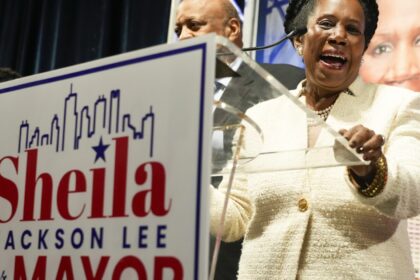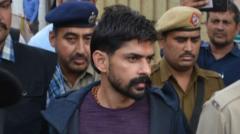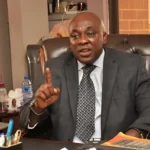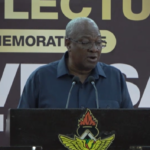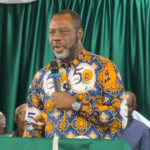The powerful Indian gangster pulling strings from behind bars
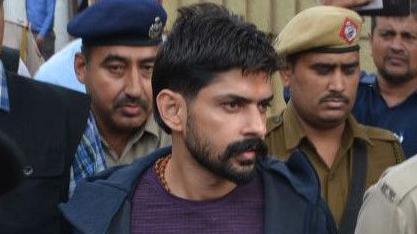
Bishnoi has been in prison since 2015, now held far from his native Punjab state in Gujarat
On Monday, Canadian police made a sensational claim.
They alleged at a press conference that agents of the Indian government were using “organised crime groups like the Bishnoi group” to target leaders of the pro-Khalistan movement, which calls for a separate Sikh homeland in India.
This was hours after both countries expelled top diplomats as tensions escalated over last year’s assassination of a Sikh separatist on Canadian soil. Delhi dismissed the allegations as “preposterous”, accusing PM Justin Trudeau of catering to Canada’s sizeable Sikh community for political gain.
The Canadian police were referring to Lawrence Bishnoi, a 31-year-old gangster from India, now back in the spotlight domestically and internationally.
Indian police say his gang is allegedly linked to the killing of a prominent politician in Mumbai at the weekend – gunmen shot dead 66-year-old Baba Siddique near his son’s office. Three suspects are in custody. An alleged aide of Bishnoi has posted on social media that the gang is behind the murder.
Once among India’s most wanted, Bishnoi has been in prison since 2015, now held far from his native Punjab state in Gujarat.
Yet, the police believe his audacious influence endures. Bishnoi is the prime accused in the sensational murder of Sidhu Moose Wala, the popular Punjabi singer gunned down near his village in October 2022.
In 2018, Bishnoi gained notoriety for threatening Bollywood star Salman Khan, accusing him of allegedly poaching two blackbuck antelopes – a revered species for Rajasthan’s Bishnoi community to which Lawrence belongs.
When he was produced in a court in Jodhpur city, he openly told the waiting media: “Salman Khan will be killed here, in Jodhpur… Then he will come to know about our real identity.” Incidentally, Siddique, the murdered politician, was a close friend of the Bollywood star.
Image source, Getty Images
Bishnoi is the prime accused in the murder of Sidhu Moose Wala, the popular Punjabi singer, in October 2022
In March last year, a news channel aired two interviews with Bishnoi from inside a Punjab jail, prompting an outraged high court to order an investigation. How a high-security inmate managed phone interviews from prison remains a mystery.
Federal investigators estimate Bishnoi continues to control a gang with 700 members across Punjab, Haryana, Rajasthan and Delhi, involved in extorting celebrities, smuggling drugs and weapons and carrying out targeted assassinations. His partner Goldy Brar, also a co-accused in the Moose Wala killing, runs the gang by remote control from Canada, say the police. Bishnoi faces more than 30 cases, with 19 currently being tried in court.
“He runs his gang seamlessly from prison without needing to co-ordinate everything,” says Gurmeet Chauhan, a senior officer in Punjab’s anti-gangster task force. “Unlike other gangsters confined to a region, he thinks big.”
Bishnoi was born into affluence. His family is among the wealthiest in their village in Punjab, living in a spacious bungalow surrounded by more than 100 acres of land. His father, a former policeman, eventually gave up his job to take care of the family land, while his mother is a homemaker. The couple raised two sons Lawrence and Anmol – both now prime suspects in Moose Wala’s killing.
Ramesh Bishnoi, a relative, told Jupinderjit Singh, a journalist and author of Who Killed Moose Wala, that Lawrence was named after British officer Henry Montgomery Lawrence, founder of the prestigious Lawrence School in the hill town of Sanawar.
Lawrence Bishnoi himself attended a convent school, riding his own bike by the eighth grade and wearing expensive shoes – luxuries unheard of for most. Known for quietly helping local children in need, he was an introverted figure with undeniable influence, Mr Singh says.
Image source, Getty Images
Indian police link Bishnoi’s gang to Baba Siddique’s (centre) killing; Salman Khan (left) has also been threatened
After finishing school in 2008, he moved to a college in Chandigarh, quickly immersing himself in student politics in the city. “He had money, style and guts,” a Chandigarh police officer told Mr Singh, explaining how easily Bishnoi attracted followers. He joined a student organisation, ran for student elections and lost – a defeat he took personally.
Police records say this turning point nudged him closer to a world of violence as he mingled with some former student leaders-turned-criminals. Soon, police say, Bishnoi’s name was tied to brawls, arson and gunfire incidents on campus.
Punjab, Bishnoi’s home state, is overrun with gangs that fuel drugs and weapon smuggling, extortion and the local film and music industry. A cash-driven economy, bolstered by drugs, real estate and illegal liquor sales, has fuelled this rise, creating an ecosystem that blends crime with Punjabi pop culture, many say.
Punjab’s gangsters don’t enter the underworld for wealth alone – they crave notoriety, a deep-seated desire to “be somebody”, according to Mr Singh.
This twisted pursuit of fame finds roots in feudal, patriarchal culture. Social media amplifies it, with many gangsters showcasing their lives online. They flaunt their lifestyles on social media, where crime is often seen as a path to quick money and glamour. This has lured retired sportsmen and young recruits across Punjab to the dark side.
By September, police reported dismantling more than 500 gangs and arresting more than 1,400 gangsters since mid-2021. In clashes with the police, 16 gangsters had been killed and over 80 wounded, while three officers lost their lives and 26 more were injured. According to police, Bishnoi has been convicted in four cases, though none yet for serious crimes like murder.
Image source, Getty Images
Canada alleges India used “crime groups like the Bishnoi gang” to target pro-Khalistan leaders
With his neatly trimmed beard, the hoodie pulled over watchful eyes, Bishnoi often wears the casual look of a young man. When the stakes are high, he demonstrates a shrewdness in managing his image. During one court appearance, he wore a T-shirt emblazoned with the image of Bhagat Singh, the revered Indian revolutionary.
In a widely circulated video, reportedly recorded in prison, the bearded gangster declares, “There is a desire for revolution in our hearts. Let’s see how much strength the enemy has.” The exact meaning of his words remains ambiguous.
Bishnoi’s rise is unlike any other. “Despite being in prison, he appears to be running his gang. Who provides him logistics or media access? Such control would be impossible without powerful allies,” says Mr Singh. Separating the man from the myth remains elusive.
With additional reporting by Arvind Chhabra in Chandigarh
Follow BBC News India on Instagram, external, YouTube, external, Twitter, external, and Facebook, external

